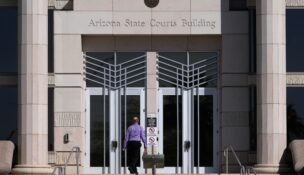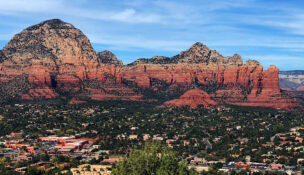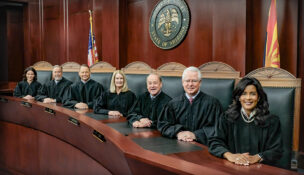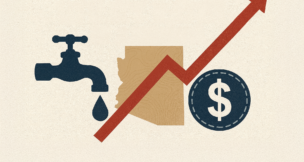Legal battle continues over Saudi groundwater pumping in Arizona
Kiera Riley Arizona Capitol Times//October 11, 2025//
Legal battle continues over Saudi groundwater pumping in Arizona
Kiera Riley Arizona Capitol Times//October 11, 2025//
Key Points:
-
Agricultural company claims attorney general lacks authority to sue
-
Filings claim authority lies solely with Arizona Department of Water Resources
-
Ongoing litigation puts spotlight on gaps in groundwater regulation, policy
A legal fight over whether groundwater pumping by Fondomonte Arizona, a Saudi-backed agriculture company, constitutes a public nuisance now centers around whether the Arizona attorney general has the right to sue in the first place.
The question has yet to be answered by a Superior Court judge, but Fondomonte’s claim that Attorney General Kris Mayes has overstepped her authority and encroached on the responsibilities designated to the Arizona Department of Water Resources under state law raises a point of reflection on the routes for policy changes and the place for litigation.
“Lawsuits are cumbersome, and they don’t necessarily achieve the kind of sophisticated results that people would like,” Kathleen Ferris, former ADWR director and senior research fellow at the Kyl Center for Water Policy said. “But again, if you can’t get anything done any other way, then people are tempted to go to court.”
Since 2014, Fondomonte Arizona, a subsidiary of the Saudi Arabian dairy company Almarai, has been pumping groundwater in La Paz County to sustain an alfalfa agriculture operation that supplies feed for cattle abroad.
The state Land Department has moved to terminate four of Fondomonte’s leases in Butler Valley, but the company continues to operate in the Ranegras Plain Basin.
In December 2024, after continually calling attention to Fondomonte’s operations across the state, Mayes filed a lawsuit against Fondomonte using public nuisance law.
State law defines a public nuisance as anything “injurious to health, indecent, offensive to the senses or an obstruction to the free use of property that interferes with the comfortable enjoyment of life or property by an entire community or neighborhood or by a considerable number of persons.”
Mayes claims that “excessive” groundwater pumping by the company has resulted in declining water levels and water quality, dry wells, sinking land, and permanently depleted aquifers, threatening to completely deplete the water supply in the Ranegras Plain Basin if left unaddressed.
She cites the company’s groundwater use in 2023 as a show of excess, noting Fondomonte had used 31,196 acre-feet of groundwater, or 81% of all groundwater extracted from the basin that year.
The lawsuit seeks a declaration that Fondomonte’s conduct constitutes a public nuisance, an injunction to cease “excessively pumping groundwater” and the creation of an abatement fund.
Fondomonte wants the lawsuit dismissed. In a new filing, the company claims that Mayes lacks the authority to sustain legal action against it, arguing instead that groundwater regulatory authority falls exclusively to the Arizona Department of Water Resources.
In a motion for judgment on the pleadings, attorney Pagie Kemper argues Mayes is using the public nuisance statute as “a backdoor to regulatory powers she does not possess” and points to the fact that the Groundwater Management Act “expressively and exclusively delegated these critical matters” to ADWR and its director.
Kemper then draws a parallel between the allegations and the requested relief, aligning it with the criteria of an Active Management Area, which is initiated by the public and ultimately managed by ADWR.
She notes, too, that the ADWR is empowered to seek an injunction to impose any restriction or penalty deemed “reasonable and appropriate” for ceasing or limiting groundwater pumping.
Kemper claimed the attorney general cannot use public nuisance as a cover, calling it, “nothing more than a pretext intended to create authority to sue where none exists.”
Fondomonte asks that the case either be dismissed in its entirety or be delegated to ADWR.
“Stripped of the public nuisance label, the allegations of and relief requested in the Complaint make plain that this is a regulatory action the Attorney General lacks the power to pursue,” Kemper wrote.
Ferris, executive director of the Arizona Groundwater Management Study Commission, the group behind the 1980 Arizona Groundwater Management Act, noted that the ADWR has maintained responsibility over water supplies in the state, although with the caveat that real regulation cannot occur without an irrigation non-expansion area or an active management area.
ADWR is testing the waters in an active management area of the Ranegras Plain, with an informal public meeting scheduled for Oct. 15 to present information and accept questions and comments.
But, even with an active management area, Ferris noted that Fondomonte could be grandfathered in under state law.
“The real issue is that in the area where Fondomonte is, there is no regulatory structure,” Ferris said. “Whoever has the deepest well and the biggest pump basically wins and can dry up the wells of other people.”
Ferris added the aim of the lawsuit may go well beyond Fondomonte.
“Mayes is attempting to approach this from a focus that is outside of the Groundwater Management Act. It’s nuisance law,” Ferris said. “I think she’s trying to find a way to stop the expansion of industrial (agriculture), because, let’s face it, that’s what a lot of this is. It’s industrial scale agriculture. It’s not just Fondomonte.”
Efforts to regulate groundwater in unregulated areas have continued to hit a wall in the Legislature. Ferris declined to comment on the merit of Mayes’ approach, but said the courts have historically caused some complications and delay in ironing out groundwater policy.
“We need to take this issue out of the courts and deal with it holistically, looking prospectively, instead of fighting it all out,” Ferris said. “What happens, though, is if things bog down, and if folks don’t feel like they can get relief, then that’s when people go to court.”
Doug MacEachern, communications administrator for the ADWR, declined to comment on the ongoing litigation but stated that the department had no plans to intervene at this time.
Richie Taylor, a spokesperson for the Attorney General’s Office, said in a statement, “The attorney general is bringing her case under public nuisance law, which she has the authority to do.”














































